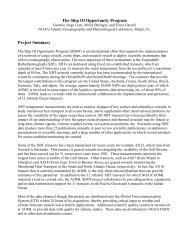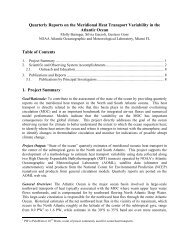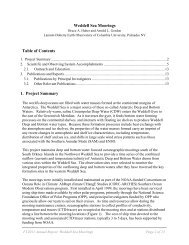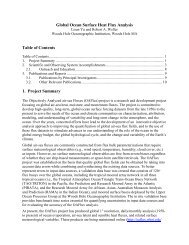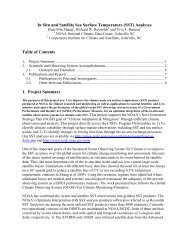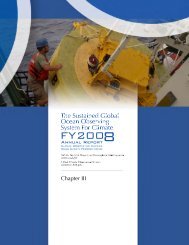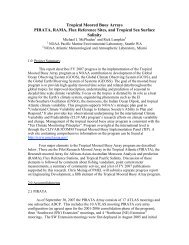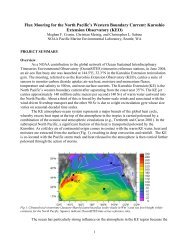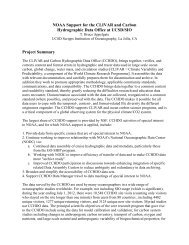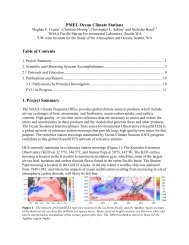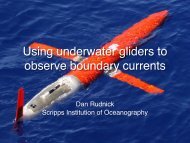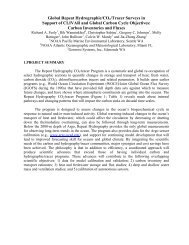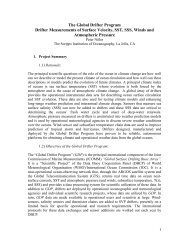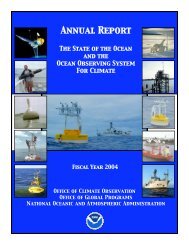GCOS Implementation Plan - WMO
GCOS Implementation Plan - WMO
GCOS Implementation Plan - WMO
You also want an ePaper? Increase the reach of your titles
YUMPU automatically turns print PDFs into web optimized ePapers that Google loves.
<strong>Implementation</strong> <strong>Plan</strong> for the Global Observing System for Climate in Support of the UNFCCC<br />
(2010 Update)<br />
Action C3<br />
Action: Review the projects contained in RAPs for consistency with this <strong>Plan</strong> and update and<br />
revise the RAPs as necessary.<br />
Who: Regional organizations and associations in cooperation with the <strong>GCOS</strong> Secretariat and the<br />
bodies responsible for the component observing systems.<br />
Time-Frame: 2011.<br />
Performance Indicator: <strong>Implementation</strong> strategy meetings held and number of RAP projects<br />
implemented.<br />
Annual Cost Implications: 1-10M US$ (90% in non-Annex-I Parties).<br />
3.1.3. National Reporting<br />
Reporting on systematic climate observation activities by the Parties as part of their National<br />
Communications under the UNFCCC has been valuable in the planning and implementation of the<br />
global observing system for climate. Updated guidelines 52 for such reporting, consistent with the IP-<br />
04, were adopted by the UNFCCC COP 13 in 2007 (Decision 11/CP.13). 53 In order to improve the<br />
understanding of climate and climate change, and for the UNFCCC to be implemented effectively,<br />
accurate and credible information relative to all aspects of climate observations must be exchanged<br />
according to these guidelines.<br />
Action C4 [IP-04 C4]<br />
Action: Report to the UNFCCC on systematic climate observations using current guidelines.<br />
Who: Parties with the UNFCCC.<br />
Time-Frame: Conforming with UNFCCC guidelines.<br />
Performance Indicator: Number of Parties reporting within specified timeframes.<br />
Annual Cost Implications: 1-10M US$ (70% in non-Annex-I Parties).<br />
3.1.4. <strong>Implementation</strong><br />
Beyond planning and reporting, it is essential to initiate specific processes to ensure progress on the<br />
actual implementation of the <strong>GCOS</strong>. Sections 4, 5 and 6 make detailed suggestions for the<br />
implementation in the different domains. As noted earlier, because almost all Actions ultimately occur<br />
at the national level, it is important to have regular reports to the UNFCCC on the actual status of<br />
implementation of the global observing system for climate. To the extent that resources allow, the<br />
<strong>GCOS</strong> Secretariat will therefore continue to monitor, and where appropriate facilitate, implementation<br />
of the global observing system for climate, keep this <strong>Plan</strong> under review, and report to the UNFCCC on<br />
progress and evolving needs.<br />
3.2. Toward Sustained Networks and Systems<br />
Observations of several climate-system variables are made in the context of research programmes or<br />
by space agencies whose primary mission is research and development. This is particularly so in the<br />
atmospheric composition, the oceanic, and the terrestrial domains. Once methods are sufficiently<br />
mature to guarantee a sustained set of observations to known and acceptable levels of accuracy and<br />
stability to their users, they need to be sustained into the future as an operational observing system.<br />
The operational system includes the acquisition (measurement), transmission (reporting), analysis,<br />
and archiving of the data housed in an organization with an appropriate institutional mandate and<br />
sustained funding. Often the optimum arrangement is for the operation to be funded as part of a<br />
research laboratory’s responsibility; in other cases it may involve the transfer of responsibility from<br />
one organization to another. This transfer of responsibility also implies sustained dialogue between<br />
the operational entities and the research community so that the operational arm may benefit from<br />
scientific advances. Although this transition into operation has been difficult to implement in national<br />
and organizational planning, recent progress involving the space agencies and some others has<br />
occurred and further improvements are encouraged. The <strong>GCOS</strong> Secretariat will, with the agreement<br />
of the involved research entities and at the appropriate time, work with the relevant international<br />
52 http://www.wmo.int/pages/prog/gcos/index.php?name=UNFCCCGuidelines<br />
53 UNFCCC (2008): Report of the Conference of the Parties on its thirteenth session, held in Bali from 3 to 15 December 2007;<br />
Addendum: Decision 11/CP.13 (Reporting on global observing systems for climate), FCCC/CP/2007/6/Add.2,<br />
http://unfccc.int/resource/docs/2007/cop13/eng/06a02.pdf#page=1<br />
31



